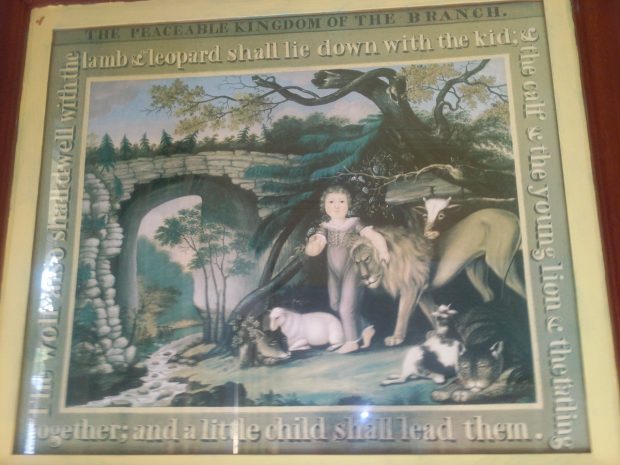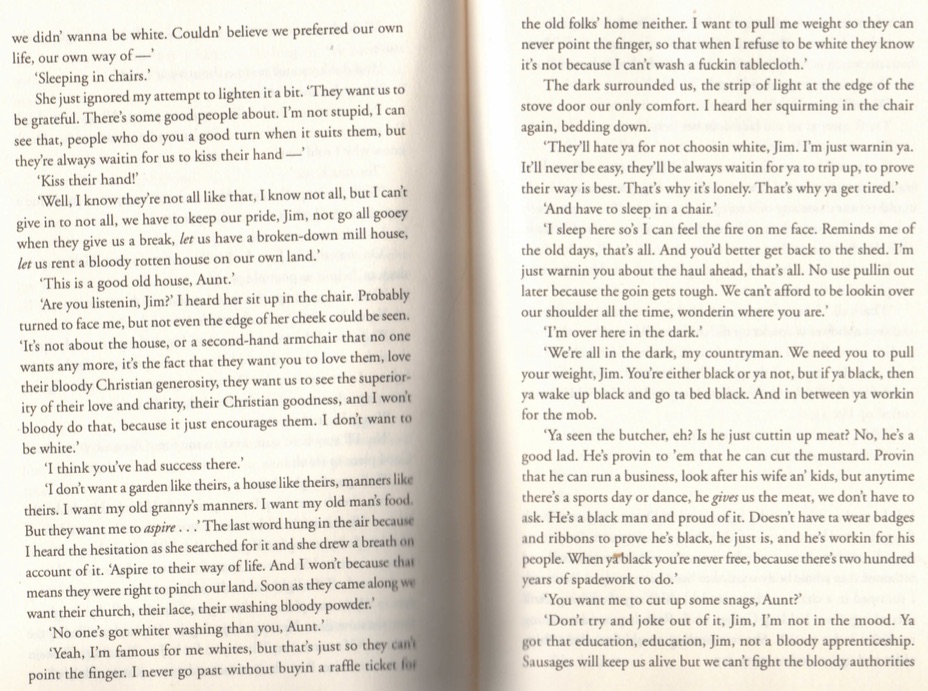Peaceable Kingdom
by Bruce Pascoe

‘And the wolf shall dwell with the lamb and the leopard shall lie down with the kid and the calf and the lion and the fatling together; and a little child shall lead them out of the wilderness.’
I grew up with this story, heard it in church, seen it as pictures on my aunties’ walls and assumed it was just another of those Christian aphorisms for peace and kindness so loved of the church that also loved beheading Africans who dared believe in another God, or worse still, tried to hang on to their land.
But one night, bored in Brisbane, yes it’s possible, I stood on my hotel bed to take a closer look at one of those pervasive scenes of innocence and love. The familiar text was painted around the border but I hardly had to read it; I could almost recite it perfectly from memory. But then I read the fine print. It was called the Peaceable Kingdom or Kingdom of the Branch. I’d always assumed the branch to be olive and the Kingdom to be that of heaven. That’s when I saw the line to follow: “When the Great Penn his Famous Treaty Made.’
I froze before the painting and scanned it closely for the first time, having spent my life since I was fourteen trying to forget Christianity ever existed, particularly the Methodist branch that had cornered the market in shockingly banal, badly written hymns and pious platitudes that made me want to wretch all over my school pants. I had two pairs, the OK and the holey. I wore the OK ones to church even though the holy ones had their own compelling Sunday logic.
Penn treated with First Nation Americans for a massive tract of land which his relatives quadrupled by dishonouring the contract. In a tiny detail of this painting Penn is reaching out to the Indians with upturned palms; the quintessential image of the pious Christian. The Indians, fully feathered, are clearly in awe of the opportunity with which they are presented; you give us your land and we’ll give you a thousand mirrors. The Indians appear humbled by the generosity because really, what were they doing with the land anyway apart from growing corn and building great villages, performing elaborate rituals, producing wonderful art, swimming in the rivers with their children, making love beneath the stars, cuddling babies by the fire … but I mean apart from that they were just flossing about. Penn was their saviour.
I stepped down off the bed and sat in a chair too hammered emotionally to twist the top off a beer. These humble little tracts that I had known since childhood contained a little phial of poison, an insidious emblem in a remote corner of the art.
The lambs and lions spooning up together held enormous charm for me as a child but suddenly the real meaning of the text was revealed. This wasn’t about cherubs and wild beasts this was just a tool of colonialism. You’re saved, you’re saved, we have arrived to save you from your savage selves. You’ll lose your land of course, but I bet you were eager to hand it over as quickly as a Seventh Day Adventist. Praise the Lord lil’ chil’n!
Colonialism used the coercions of muskets and poisoned flour, manacles and incarceration, removal of children and cultural destruction but it also had these gilt edged tropes that were introduced to children like smallpox variole when their parents read to them as they snuggled into their blankets. And blankets poisoned with smallpox variole were exactly how the colonists introduced the disease to First Nation Americans. When you’ve lost your land, house and clothes a free blanket is readily accepted. Some historians claim smallpox was introduced into Australia by the same deliberate ruse.
But I was wracked with shame for having accepted the Peaceable Kingdom artworks as innocent and puritanical Sunday School Stories. They were weapons of war and I had accepted them into my world as blindly as the Trojans who rolled the fatal horse into their village.
The variole is still being smeared on our blankets. In the last decade I’ve been offered publication by a couple of Australia’s biggest publishers only to be asked at the editing stage to remove the piece about children being abused in Christian hostels by their carers and in another book to delete Aunty’s speech because it’s boring. That speech was burnt into my memory like sulphuric acid poured on flesh.

It wasn’t fiction and that might be considered a failure of artistry but it was the backbone of the book, in all its vehement articulation of Australian duplicity. The speech remained but the relationship between writer and publisher didn’t.
Even today Australians seem to prefer the story of the Peaceable Kingdom over the logic of Aunt’s analysis of Australian history.
You had to deliver that tirade of vehemence didn’t you Aunt because I had cocooned myself in the fairy tale of Australian exceptionalism and bloodless occupation of the soil.
And Aunt, thank you for telling jokes to me on the last day of your life and thank you for telling me you loved me and I hope you have noticed I still use your speech as a way forward for Australia, a way into our history and away from the Golden Book Fable of the Peaceable Kingdom.